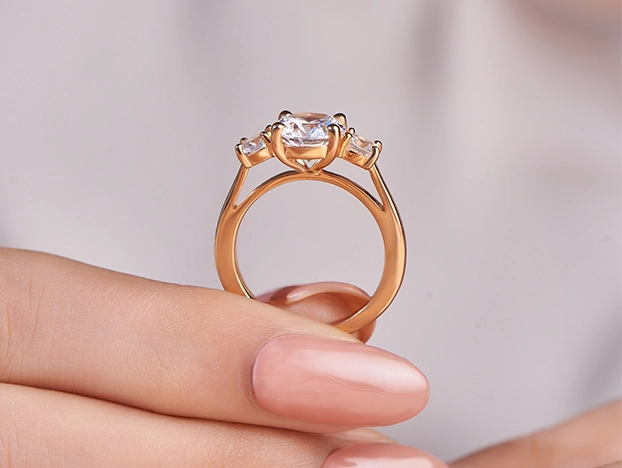Some Known Factual Statements About Engagement Rings
Table of ContentsIndicators on Engagement Rings You Need To KnowThe Buzz on Engagement RingsEngagement Rings Fundamentals ExplainedSome Known Details About Engagement Rings Not known Details About Engagement Rings Not known Factual Statements About Engagement Rings
Tension-style setups additionally give much far better protection for the gemstone. The majority of tension-style setups are made for rounded brilliant diamonds or other rounded gemstones, but they can be modified to fit many various other shapes. The setup can also be changed to have accent treasures around the centre stone or to enable for a side stone on each side of the centre stone.Creates an optical impression of the centre gemstone hanging in the air. If it has prongs, they can become loosened with wear. This is easily treated by having the ring on a regular basis cleaned and examined by a jeweller.
The Best Guide To Engagement Rings
The very first ring with a real stress setting was made in Vreden, Germany in the 1970s. Ursula Exner and widely known artist Walter Wittek worked together to style and make this initial ring. In the complying with years, various other jewelers made their own tension setups, along with the more protected and functional tension-style setups.

This provides the ring a simple, however fashionable charm that functions well for both males and females's wedding celebration rings, as well as engagement rings. The flush setting is sometimes likewise called a gypsy setting. We can't state for certain how it came to have that name, however probably it is because the setting represents a complimentary spirit.
The Ultimate Guide To Engagement Rings
Flush settings function well for round, square or rectangle-shaped gems, however they can be difficult to adapt to certain elegant cuts, for instance, a heart-shaped ruby. Maintains the gemstones safe and protected.
Reminds the proprietor to cultivate a free spirit (engagement rings). Considering that the treasures are set in the shank, they obtain a minimal amount of light and generate less radiance. Frequently impractical for heart-shaped gems and a few various other gems with elegant cuts. Rings with flush or gypsy setups have been around since the late 1800s.
Solitaire involvement rings have just one centre gems on a plain band. Lots of various other interaction rings, you could try here however, also have accent gemstones. Accent treasures can be diamonds or a variety of other jewels. They generally range in size from little to modest and are set close with each other. Accent treasures are included in involvement rings specifically to boost luster and sparkle.
Not known Facts About Engagement Rings
There are 4 setups that are widely made use of to hold accent gemstones. Castle setups are made straight on the shank of the ring.
The prongs in a castle setup can be directly and down with basic rounded tips or they can be reduced at an angle to make sure that they appear like fishtails. These fishtail prongs can likewise be called French cut prongs. Castle settings are very functional. They can be established completely around the shank, simply positioned across the ring's shoulders or used to develop a halo around the centre gems.
A Biased View of Engagement Rings
The steel sides of the castle setting are constantly cut reduced, typically in a scallop pattern. This permits a lot more light to get to the accent gems and boosts their brilliance. If it is well made, the low scalloped side view it now of the castle setting can likewise develop an optical illusion. It enables the sides of the gems to be easily seen and creates the perception that the treasures are being kept in an undetectable setting.
Produces the illusion of an undetectable setting. The little prongs can end up being loose. We recommend that rings with the castle setting be cleansed periodically by a jeweler, so that the prongs can be examined.
The prongs on a castle setup can capture on garments, however this is unusual because the prongs are smooth. The castle setting can be used to make gorgeous eternity rings. The first endless time rings were made in the 1960s. Those initial rings, like infinity rings today, have a row of closely established gems totally encircling their shank.

The 5-Minute Rule for Engagement Rings
The bead setting is a really safe setup. The sides of this website the network protect the accent treasures from bumps and scratches and the handmade prongs seldom come to be loose. One disadvantage of the grain setting is that the gemstones obtain less light since they are set down in the network. This causes the treasures generating a little less sparkle and sparkle.
Every treasure in the bead setup is bordered by 4 shiny grains that are degree with the top of the shank. These grains capture the light and discharge their own sparkles everywhere. The beads' sparkles along with the sparkle and sparkles created by the accent treasures bring the bead setting to life and offer it constant shimmers.
They can use it to make infinity rings, in addition to to embellish the easy shank or more complex split shank that some involvement rings have. In the standard grain setup, the accent gems are embeded in one straight line. Sometimes, however, jewelers will certainly increase the glimmer on an involvement ring by adding 2 or more identical lines of grain set gems.